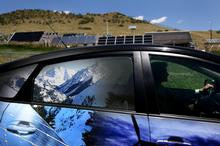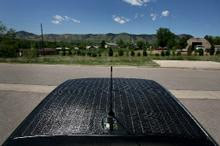Scientists at the National Renewable Energy Laboratory in Golden are testing a spruced-up Toyota Prius, a plug-in hybrid sedan complete with a solar panel attached to its oval roof and a bigger battery in the trunk to supply power in lieu of the gasoline-fueled engine.
The result: A spunky Prius that runs the initial 60 miles mostly on battery, adding up to a fuel mileage of 100 miles per gallon.
"The stored power in the battery does a great job of displacing petroleum," said Tony Markel, a senior engineer at NREL who has been working on the 2006 model Prius for the past two years. "For most people, their daily commute is about 30 miles, so this car would run virtually on battery and only need to be recharged at night."
Displacing petroleum is a desirable virtue today, as the nation battles global warming and skyrocketing fuel prices.
On Monday, Colorado's average price for regular, unleaded gasoline hit a record high at $3.943 a gallon, nearly 70 cents higher than the $3.258 a year earlier.
But the spruced-up Prius doesn't come cheap.
The lithium-ion battery, which can be recharged using a standard electrical outlet at home or even at the workplace, has a price tag of $40,000. And the solar panel on the roof cost $2,500.
All told, the car adds up to almost $70,000 - but as NREL says, it's only a unique research model at this point.
And if the car runs at more than 35 miles per hour, the gas engine comes to life to supply more power and consumption goes up.
Detroit automakers are interested in NREL's research, Markel said, adding that the goal is to bring down cost. Xcel Energy, Colorado's biggest utility, also is keen about vehicle-to-grid technology, which would have car batteries supply excess electricity during hours of peak demand.
Although NREL has yet to determine the experimental Prius' payoff time, it could improve with biofuels such as ethanol or biodiesel.
NREL says that light, plug-in hybrid vehicles could cut in half the demand for fuel, making it practical to use E-85 - a blend of 85 percent ethanol and 15 percent gasoline. Also, the fuel cost savings could amount to more than $500 per vehicle a year.
"I think high energy prices are here to stay, and to go even higher," said Bryant Gimlin, energy risk manager of Gray Oil & Gas, a diesel and gasoline wholesaler. "It will not only encourage new technologies such as plug-in hybrids but make them more price effective."
"But it will take a number of years to do that and make a serious dent on oil consumption," Gimlin added.

